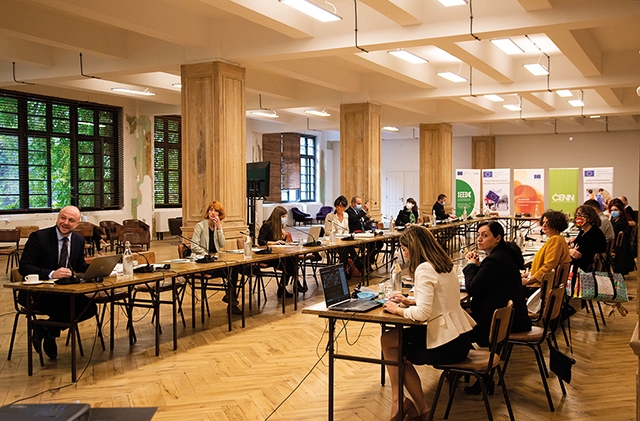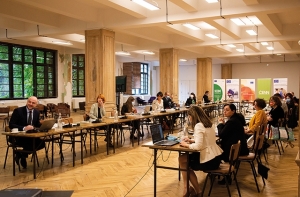EU4Youth, CENN & Mercy Corps Strengthen Youth Employment through Social Entrepreneurship
Youth policy and youth work is a relatively new field in Georgia; however, it is becoming increasingly popular among young people and organizations. The main drivers of this field are youth organizations, which create and promote various services and possibilities for increasing the active role and involvement of youth.
The EU4Youth Program, in partnership with the EU Delegation to Georgia, plays one of the key roles in the development of this direction in the country. The EU4Youth Program was launched by the European Union in 2017 to empower young people in the Eastern partner countries. As part of the Eastern Partnership, EU4Youth fosters the active participation of young people in society, and their employability, by developing youth leadership and entrepreneurship through a variety of actions, including capacity building, fellowships, and support to policy dialogue, and by providing grants to organizations active in these areas.
Youth opportunities in Georgia was the central theme of a two-day conference in Tbilisi organized by the EU4Youth program on 21-22 October, aimed at local, national and international stakeholders in youth policy. The event sought to raise awareness, share best practices, and discuss new opportunities to strengthen youth employment, entrepreneurship and participation in Georgia.
In Georgia, the event on youth employment and entrepreneurship was held for the first time with a focus on exchanging information on youth entrepreneurship, their participation, and current trends in the field of employment.
In the format of a round-table discussion, the two days focused on the EU Youth Dialogue, the EU Youth Guarantee scheme and the Youth Social Entrepreneurship initiatives under the EU4Youth program that support opportunities for young people in Georgia. The agenda included speeches from European Union and Georgian officials, EU4Youth program teams, and organizations specialized in youth policy and advocacy.
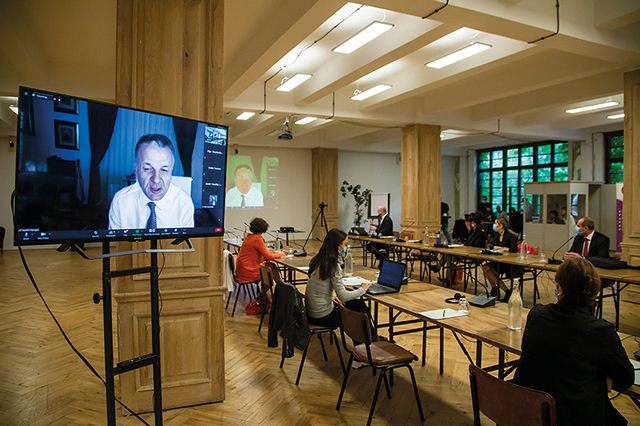
The meeting brought increased understanding of the youth strategy and initiatives being developed and implemented in Georgia with the support of the European Union. Input from stakeholders shaped further opportunities for cooperation and best practices.
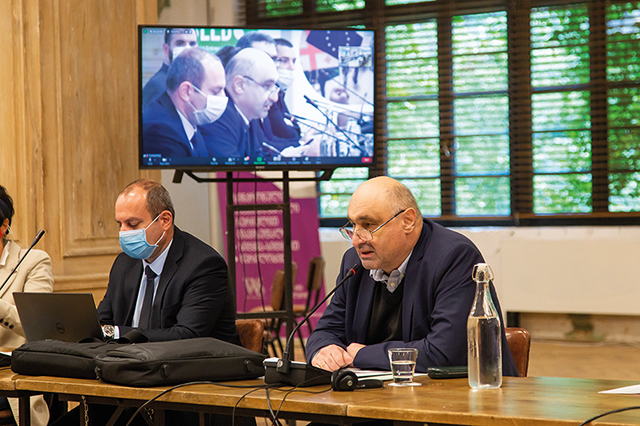
The first day of the conference was opened by the welcoming speech of Vassilis Maragos, the Head of Unit/Armenia, Azerbaijan, Belarus and Eastern Partnership, DG NEAR. In his welcoming remarks, he emphasized that from the EU side, supporting youth is one of the main priorities of the cooperation between Georgia and the Eastern Partnership.
“Through providing the necessary conditions for education, employment and more active involvement in society, we help them realize their potential and become future leaders and entrepreneurs. The EU-funded projects help Georgian youth, especially vulnerable young people, to improve employment prospects by enhancing entrepreneurial potential and developing the skills necessary for the labor market. The above provides better skills for a better future,” he pointed out.
Mr. Maragos noted that the EU-funded projects in Georgia contribute to having more competitive and highly qualified young professionals in the local labor market, and working in this direction will actively continue in the future. “In March, the EU launched a Joint Communication on the future of the Eastern Partnership, outlining the strategic objectives for the coming years. These have been confirmed also by EU Member States and the leaders from all EaP countries. Increasing engagement and continued support to youth will be a key priority in this context, both for mainstreaming across the different policy areas and for what we call a New Deal for Youth. This New Deal includes both a dimension of youth participation in policy-making and an economic dimension, linked to youth employment, education and skills and youth entrepreneurship. To give an example, we are going to support more structured Youth Dialogue to enhance the involvement of youth in policy-making. In Georgia, we would hope that the National Youth Council and the Youth Agency can take a leading part in this. Last but not least, our future initiatives on education and skills, on youth employment and entrepreneurship should also support the key transformation of our age, i.e the green and digital transformations. These will be main points on our agenda and part of the EU’s long-term engagement for the coming years,” he said.
Maragos highlighted the importance of the reform proposed by the Youth Agency for the creation of an ecosystem for the Georgian youth sector, and thanked Georgia for its implementation, which is “an excellent achievement for the country.”
Deputy Head of the Youth Agency, Vakhtang Baakashvili, took part in the round table discussion. At the meeting, the ‘Georgian Youth Strategy 2025’ was discussed in the context of youth participation, empowerment and entrepreneurship. He further discussed the approach and vision of the Youth Agency in the field of entrepreneurship, and announced the next phase of the Agency's reform and future plans.
The event was moderated by Giorgi Kakulia, Key Expert, EU4Youth Program Coordinator.
“Today’s event, supported by the EU, is a part of a long-term process which envisages consultations with various interested parties, which, as a result, is expected to provide for the creation of a kind of a mechanism for young people for further active participation and decision-making in political, economic and social processes,” he noted.
The Forum included discussion of preliminary outcomes of thematic reviews of youth related policies, practices and instruments in EaP countries, with a focus on Georgia, the role of the EaP CSF National Platform in Georgia in promoting and supporting youth participation, and the current status of youth policy in Georgia.
Ms Nino Veltauri, Acting Deputy Director of the State Employment Promotion Agency, spoke about the measures to mitigate youth unemployment in the country.
Parallel workshops on Youth Dialogue and Youth Guarantee were held within the framework of the event, where participants discussed the issues of giving more opportunities to the young people to become more active part of society and contribute to economic development of the country through their activities.
Workshop rapporteurs concluded that the conference served as an important opportunity to deepen communication and cooperation between various organizations and stakeholders in order to achieve the common goal: strengthening and supporting the young generation of the country and caring for their improved education and living conditions.
The second day of the event focused on the theme of Youth Social Entrepreneurship (YSE) and provided space for discussion about YSE needs and challenges in Georgia. Participants were able to hear from local and international NGOs dealing with Social Entrepreneurship projects, who provided their insights about various support mechanisms and the engagement of local actors in the field.
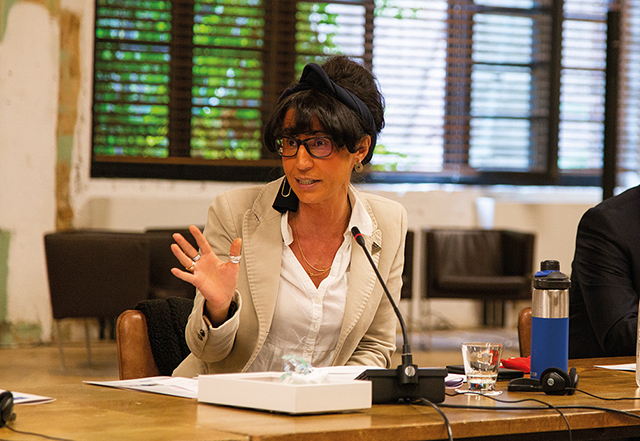
In her welcoming speech, Nana Janashia, CENN Executive Director, stressed the importance of integrating environmental approaches with entrepreneurial ones in order to better contribute to sustainable development. She also stressed the role of organizations and the resources they provide as indispensable for creating fertile grounds for pattern-breaking social change.
“CENN, together with Mercy Corps, is pleased to co-host an EU4Youth event in Georgia, focused on youth opportunities, in order to strengthen youth employment, entrepreneurship and meaningful participation in their societies. Social and green entrepreneurship are key drivers of youth empowerment in the EaP region and CENN, with the EU’s support, is happy to contribute to this by encouraging young people in Georgia and Armenia to start their own green start-ups, generate income, become self-employed and contribute to their national economies. Speaking of economic development, CENN shares the EU Green Deal, a blueprint for greener and climate smart economies and societies, as a sustainable recovery plan, especially during the COVID-19 pandemic,” Janashia said.
Nino Samvelidze, Program Manager at the Delegation of the European Union to Georgia, addressed the EU’s contribution to youth empowerment in Georgia and accentuated the priority areas for the upcoming years.
“Investing in human capital is one of the objectives of EU-Georgia cooperation in order to foster societal and economic resilience. Bridging the gap between the labor market and the education sector, increasing support for the employability of youth, develop entrepreneurship skills, as well as supporting active labor market measures, are the main priorities for our interventions in Georgia”, she said.
All speakers stressed that supporting young social entrepreneurs through targeted capacity-building actions such as increased access to finance, boost in visibility and coaching, is vital. If these and more skills can be defined and taught, there is the chance that social entrepreneurship need not be so rare in the future. Instead of one entrepreneur in a million, there may be one in a hundred or one in five.
Over the last five years, Mercy Corps have spent a lot of their resources on programs that help people in need. The organization has been actively contributing towards the development of the entrepreneurial potential of young people to positively engage in society. Irakli Kasrashvili, Country Director at Mercy Corps, said: “In the EU4Youth SEAG program, Mercy Corps supports skills building of young people in terms of business and entrepreneurship, to establish and develop social enterprises in Georgia and Armenia. Over the years we have also supported the active involvement of youth from the Samtskhe-Javakheti region in Local Action Groups, established in the framework of ENPARD projects, and their involvement in local decision-making to promote rural development.”
Revaz Charkviani, Head of the Youth Agency of Georgia, shared the core objectives of the Youth Agency’s development strategy in regards to creating a favorable ecosystem for youth empowerment and resilience in Georgia. He too stressed the importance of removing specific sectoral, perception and legislative barriers in the enabling environment that prevent social enterprises from starting up, growing and thriving.
"Georgia will continue development of the youth sector and evidence and rights-based youth policy with the aim to create a sustainable ecosystem for youth development, which enable the youth to fully realize their potential and get actively involved in all areas of public life; increase young people's understanding of democratic values and principles and support them to claim their own rights; as well as to assure full and equal economic empowerment, protection of health and well-being and equal access of information and resources to all young people in Georgia", said Mr. Charkviani.
Social entrepreneurship bridges an important gap between business and benevolence; it is the application of entrepreneurship in the social sphere. The discussion benefited from the insights of local CSOs working in the field, who succeeded at combining the passion of a social mission with an image of business. They all highlighted the importance of national government’s recognising of social enterprises and adopting relevant legislations to support them. The attempts of aspiring social entrepreneurs, they said, harbour many of the struggles merely because there are no legal frameworks to support the cause.
The overall objective of the 2-day conference was to raise more awareness, support and participation for the practice of social entrepreneurship in Georgia; also to facilitate the rapid circulation and sharing of solutions at the global level. The event was an important step in this direction.
The event was organized by the EU-funded EU4Youth Program, in partnership with the EU Delegation to Georgia and EU4Youth implementing partners in Georgia, CENN and Mercy Corps.
